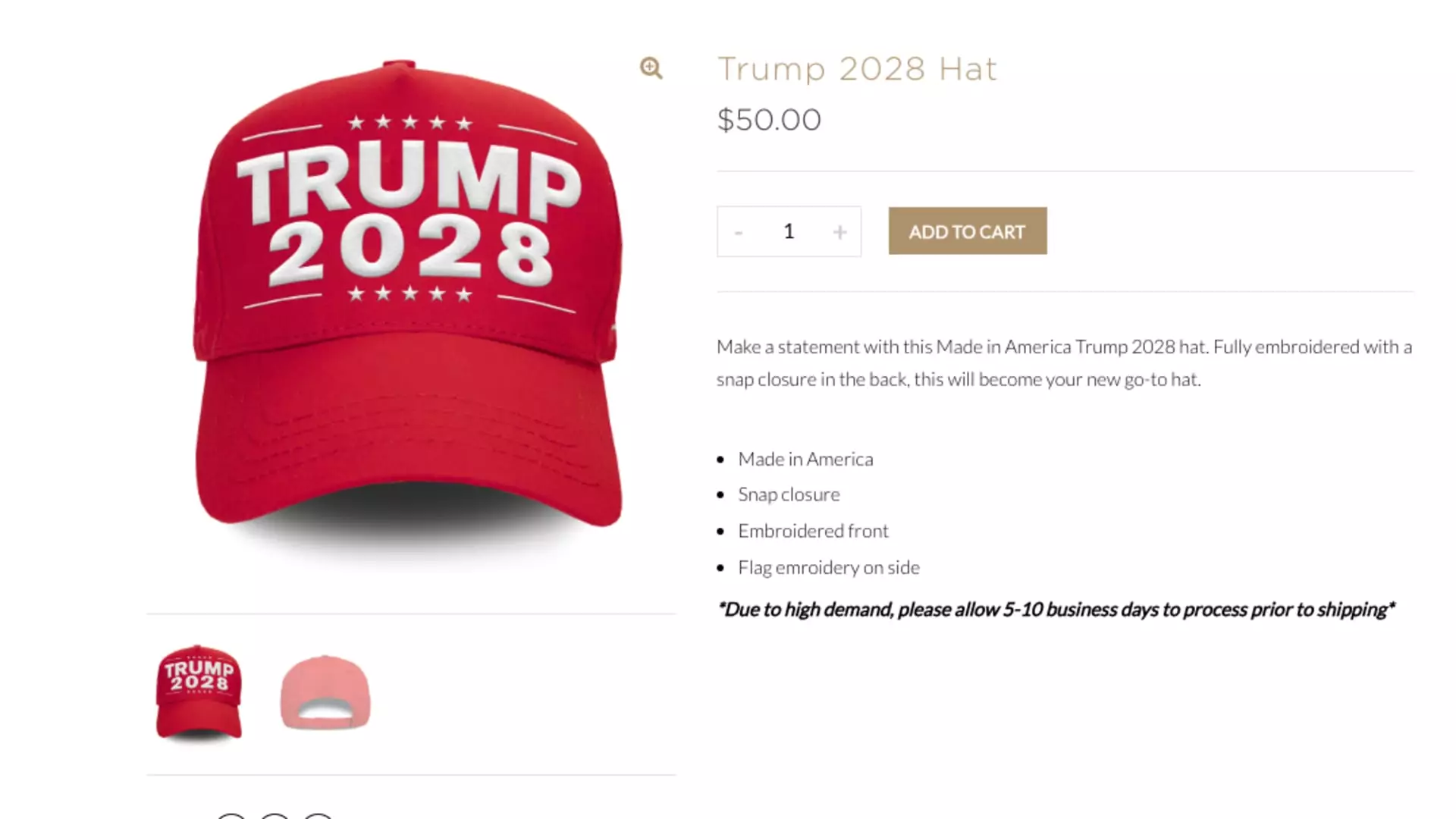The latest marketing strategy from the Trump Organization, featuring red merchandise emblazoned with “Trump 2028,” is much more than a mere commercial gimmick. It signals a disquieting ambition that transcends the borders of simple brand loyalty. While some might brush it off as a playful jab or a nostalgic nod to his past victories, it is an alarming indication of how a significant faction of our political realm is willing to toy with foundational norms in pursuit of power. The implications of this campaign could extend far beyond the confines of an online store; they risk destabilizing the very essence of democratic governance as we know it.
It’s crucial to recognize that the aspirations being toyed with are not limited to a mere re-election campaign—they represent a desire to challenge the very constitutional barriers that maintain the balance of power in our political system. The 22nd Amendment clearly states that no individual can be elected to the presidency more than twice. If we allow the discourse to shift towards legitimizing a potential third term for Donald Trump, how soon might it become plausible for others to draw similar conclusions? We stand at a precipice where merely considering a third term risk undermines the democratic principles that protect us all.
The Political Circus Unfolds
The farcical nature of the present political landscape becomes even more pronounced with the commentary and actions of various figures surrounding Trump. Take, for example, White House Press Secretary Karoline Leavitt’s flippant dismissal of the constitutional barriers as she promotes the “cool” factor of the hat. This is not just tasteless; it’s symptomatic of a deeper problem: the normalization of authoritarian tendencies masked under populist rhetoric. When government officials casually endorse merchandise that flouts constitutional law, they send a troubling signal to the public.
Imagine a society where the rules can be bent or rewritten when convenient. We’ve seen elements of this already in various political circles, where the ethical consideration of actions is frequently overshadowed by the quest for electoral gain. Trump’s innuendoes about his potential third-term ambitions and the backing of characters like Steve Bannon emphasize the growing divide between what is permissible within a democratic framework and what is being subtly pushed as acceptable politicking. As they suggest loopholes and obscure interpretations of the law, they are not just flirting with the constitution; they are undermining it entirely.
The Cult of Personality
The path to understanding the allure of “Trump 2028” often lies in the cult-like mentality surrounding Trump himself. His supporters frequently elevate him to such an extent that his personal brand is inextricably linked with their political identity. This devotion pushes them to sanitize his shortcomings and exaggerate his potential, thereby blurring the lines between reality and a fabricated narrative. When figures like Rep. Andy Ogles propose amendments that selectively allow Trump a third term while excluding others, they embody a troubling trend of personal loyalty overshadowing institutional integrity. Such actions are not just isolated attempts; they represent a growing faction willing to rewrite the rules for the sake of their idol.
Moreover, this crisis of accountability reveals how susceptible our political discourse has become to the whims of public opinion driven by manufactured outrage and fervent devotion. The notion that the presidency might become a product of personal charisma rather than constitutional legitimacy is terrifying. It detracts from the civic discussions we ought to be having about inclusion, equity, and shared governance, all of which are increasingly becoming secondary to the cult of personality entrenched in Trump’s sphere.
Rejecting Authoritarianism
The potential specter of a Trump 2028 is an urgent call to action. We must advocate for a political environment rooted in the tenets of democracy, where we prioritize the rule of law over the allure of personal ambition. Our vigilance must extend beyond mere electoral cycles; it should encompass a robust commitment to uphold the integrity of our Constitution. The stakes are higher when we acknowledge that relinquishing our principles in favor of populist sentiments can lead to a slippery slope toward authoritarian governance.
By vigorously opposing such endeavors and valuing respect for the democratic foundations laid down by our forebearers, we stand a chance to build a political discourse that recognizes the intrinsic value of every citizen in shaping our future. This is not merely about Trump—it is fundamentally about us and what we choose to accept. Let us reject this dangerous illusion and reaffirm our commitment to a democracy that empowers rather than undermines, respects the rule of law rather than flaunts it, and unites instead of dividing.

